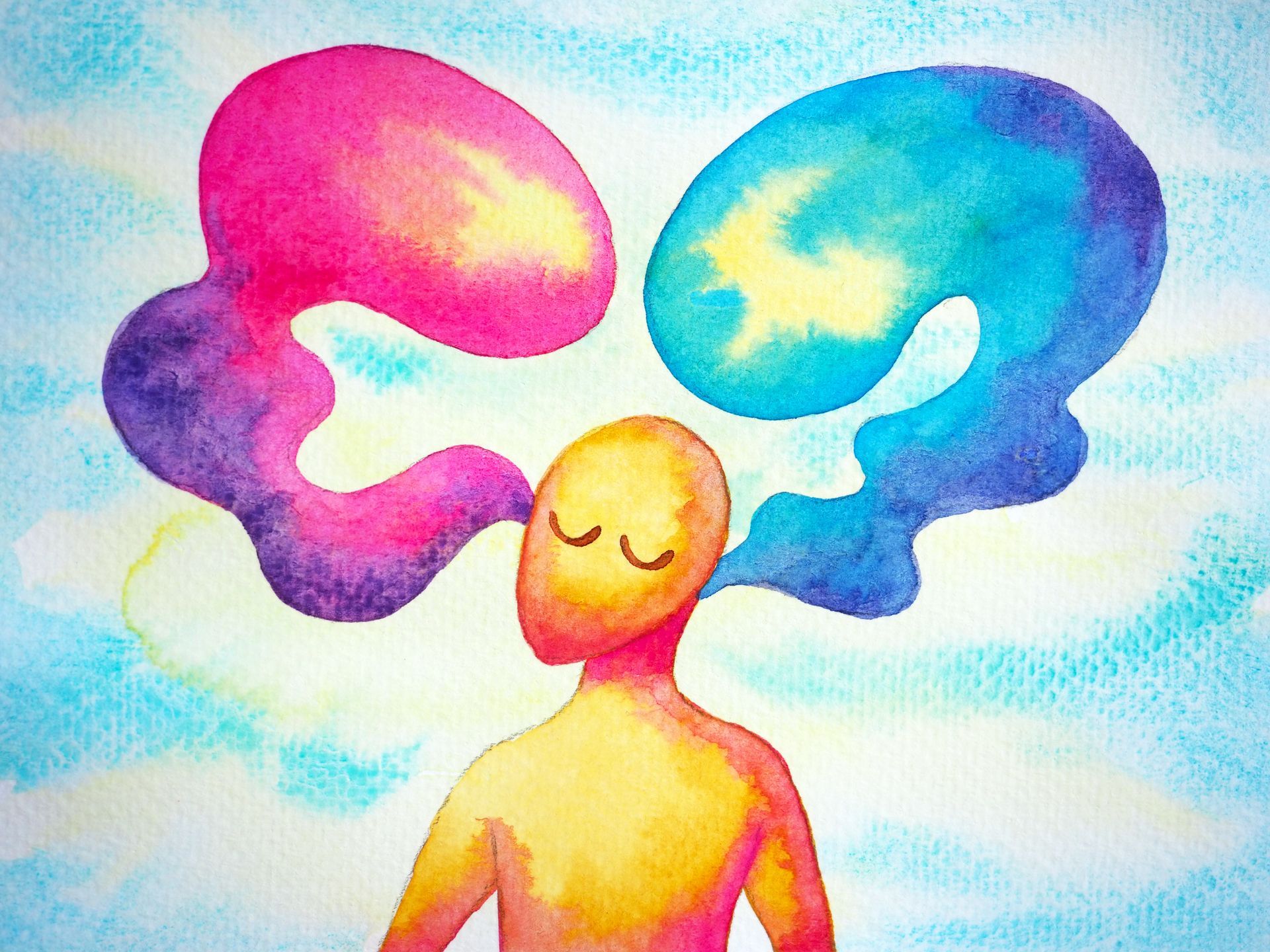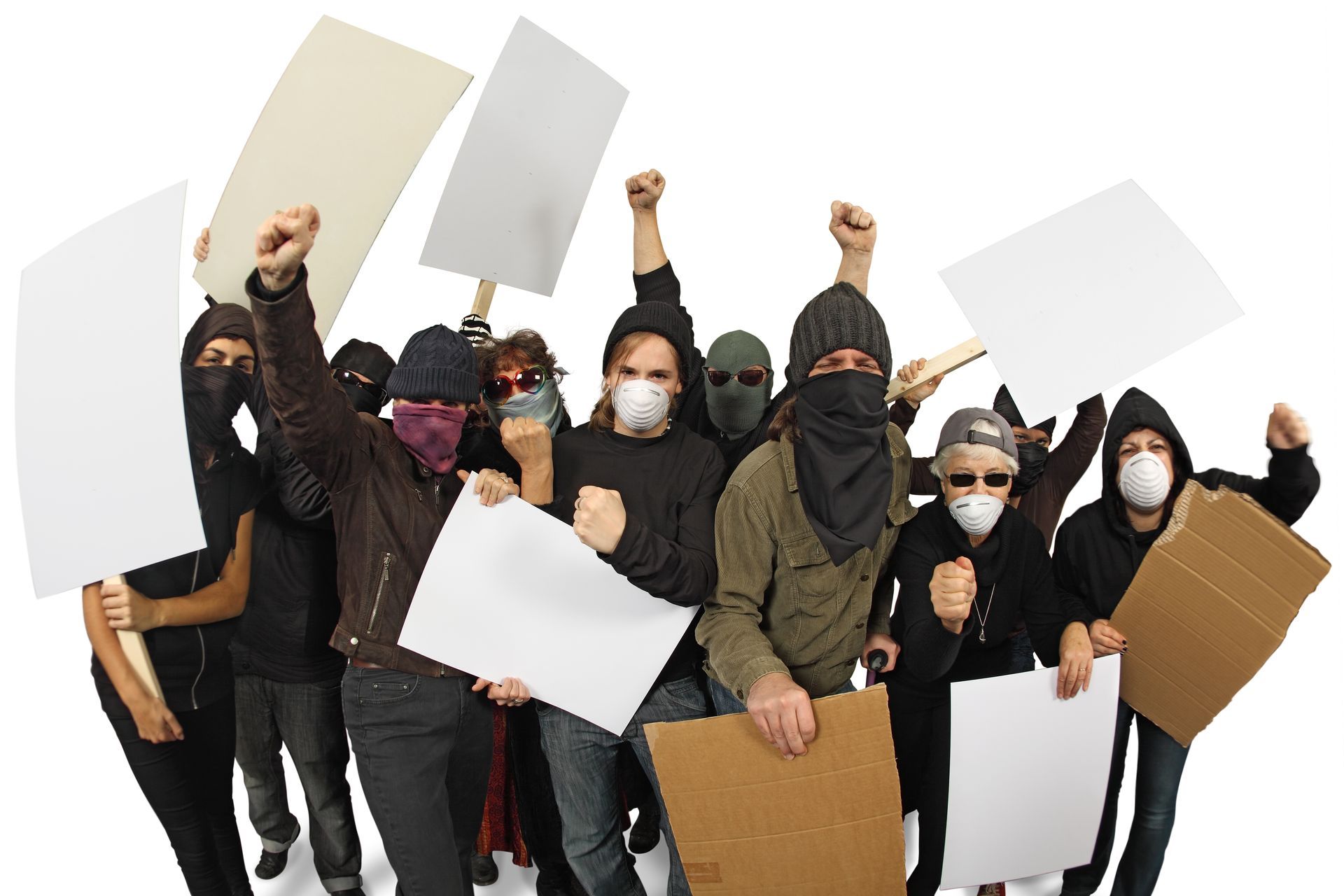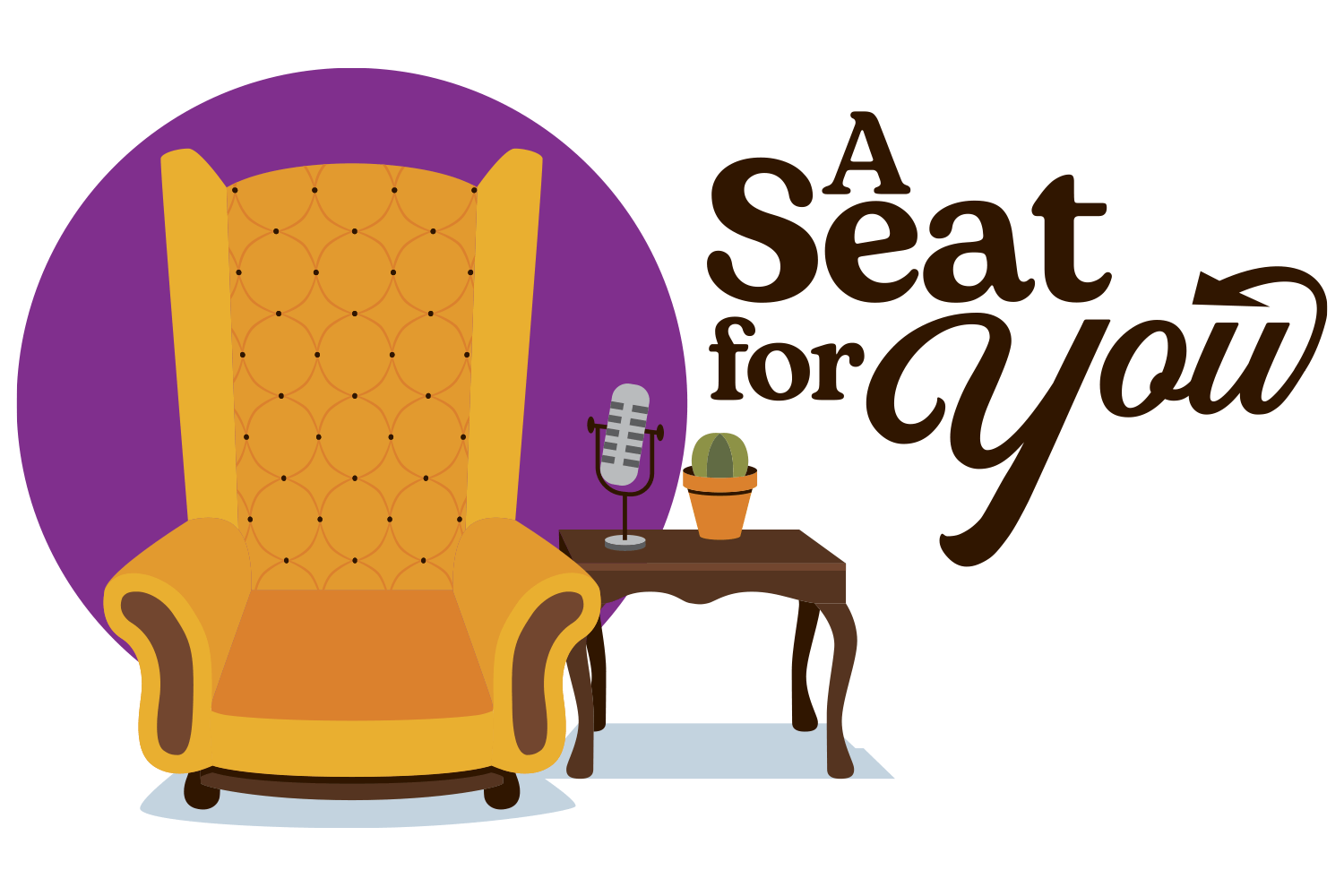Episode 10-MEME-ories & Musings: Sparking Thought-Provoking Conversations with Memes
April: [00:00:00] Welcome back, everyone. Leslie normally does this because she's so much better at it. I say really awkward things. Oh, but anyway, today we are wanting to share with you some things that we have saved in our shared Instagram folder of possible topics to converse or talk about. So, today we're going to share a few of each of our favorites and then explain why we saved it.
And hopefully you enjoy it. So, do you want to start?
Leslie: Sure, I will get us started today. Um, one of the ones, I think, I'm not sure who actually saved this, I think it was you that saved it, but I really liked it. So I'm going to read the meme first, and then, maybe since you saved it, you can say why you saved it, and I can chime in, because, um, I just, again, really like this one. So,
"a bottle of water can be fifty [00:01:00] cents at a supermarket, two dollars at a gym, three dollars at the movies, and six dollars on a plane. Same water. Only thing that changed its value was the place. So the next time you feel your worth is nothing, maybe you're at the wrong place."
April: Mm. Mm hmm. Yeah, that's a good one.
Yeah, um, this was actually posted by Clarity Counseling and I saved it because it's so simple and yet so profound and it's something that we need to, you know, reevaluate in our minds because we, we tend to stay at places where we know that our worth is not as valuable. You know, we tend to just stick it out
Leslie: yeah, I mean, I think, I think this is something that everybody, self worth, self love, those are like the two biggest issues that I think comes up in counseling for [00:02:00] really anybody. Um, and, you know, I think it is issues for people that don't even go to counseling and don't know how to verbalize or, kind of put into feelings why they feel certain ways.
It's like they have no awareness around the fact that they don't have self worth. Worth or value themselves in places, like you said, they might stay in a relationship way longer
April: or a job.
Leslie: A job,
April: um, because they think that's what they deserve.
Leslie: Right? And trying to figure out how to love yourself is like just the hardest thing to do. And I, I mean, I don't, I don't know why. I mean, why do you think that is?
April: Well, I know for me, and you know, people like me, it's hard to love yourself because we've been raised to not trust ourselves. [00:03:00] That your heart is deceiving and, um, that we are, you know, the lowest of sinners and all deserve eternal damnation. And so that's... That would probably be a good one for me. You know, that, that, that tends to get to you after a while.
Mm hmm. You know? Mm hmm.
Leslie: I guess, I mean, I guess everybody's a little different. I mean, everybody goes through different situations. I think for me, one of the things, just my personality traits and, you know, my, my makeup of a human, you know, not feeling... Like you're good enough or, abandonment issues or things that might happen when you're younger in life.
It's like if someone, you know, if you're a kid and you don't really understand dynamics of things and someone that is supposed to be important in your life leaves your life without really much explanation, you [00:04:00] know, I guess maybe you can internalize that and you don't really know that. It could have an impact of feeling not, not enough, which could then lead to, which could lead to a lack of self love or just that constant, spinning in your head of, of why you weren't good enough, maybe.
Right.
April: I mean, that's for you. That's very real and very personal because, you know, your, your dad kind of not being involved from early on. Sent you into a, a path. Right. And that path has continued like, in your relationships. That's always a, a fear.
Leslie: Correct. And it wasn't until, you know, much later in life, you know, probably early 40's of going into counseling and even identifying what that was because I, I never even thought about it being how I valued myself.
April: Right. [00:05:00] Or how that value was placed. And engraved in your mind really early on.
Leslie: Right. And this meme, you know, how, why it stood out for me was, Yeah, it is the same thing. It's water. And why is it just, why, why don't, why is there a, Set your own price point wherever you're at. And it's, you know, scarcity, demand, supply and demand.
You're on a plane, you want the water, there's no other option. So you have to buy the water on the plane, right? Um, I guess they give you water for free. That's kind of a weird meme, but, it's so important to make sure
April: You of bottled water. Right. Like if you want, like, you know, Voss. Right.
Or Evian. Right. They're gonna give you a plastic cup with ice in it. Right. And it's gonna have a total of seven sips in it.
Leslie: And if, if your self love is a plastic cup with ice in it with 7 sips, you know, that's good enough. , and I think if I could give [00:06:00] anyone advice, and I'm, I'm not a professional, so please don't feel obligated to take any of this advice, but anything that I've learned, it all starts with ourselves.
And the first place you have to look is inward, and figure out , the I am statements. Can you look into a mirror and stare into your eyes and say, I am loved, I am valued. I am worthy, I am whatever. Fill in the blank. Can you say those things and really feel it in your core, that you're not lying to yourself?
April: Right? And if you're involved in a relationship, a job, a hobby, whatever it might be, any type of community, a church, whatever that looks like, And your value feels squashed, or stifled, or devalued. It's a very strong possibility that you are in the wrong place.
Leslie: Right. Yeah. So, this is a really good meme. Yeah. Next.
April: Next. Um, this one. [00:07:00] I can't even pronounce this person's name, but I'll give it a shot. The meme says it's a picture of a, like a Japanese wave. It says
"enlightenment is when a wave realizes it is the ocean. "
And the quote is by Thich Nhat Hanh. I'm sure I butchered that, but Thich, I'm super sorry. Anyway, "enlightenment is when a wave realizes it is the ocean."
So, I think this can have like, multiple meanings depending on who you are and... what state of mind you're in in that moment, honestly. So initially, whenever I read this, the first thing that came to mind was, realizing that. So if you make yourself the wave, what, what is the ocean, what represents that in your life?
And so I think what came to mind first was like the church, honestly. And I was part of that. And I can say, well, [00:08:00] they, this, and they, that, but for the longest time, I was part of that, and I contributed to that. You know what I mean? Whatever that is, it can be good, bad, whatever that is, um, I was the wave, which is part of the ocean.
You know what I mean? You can also look at it in another sense, a more positive sense. Like a wave just thinks it's a wave. But really, maybe if the wave could turn around and see, Oh, this is me. I am this important. I am this massive and miraculous and a wonder.
Leslie: Yeah, I mean, when I, when I see that quote, it makes me realize that whether you are the wave, the action of the wave, or the body of the ocean, we are all one.
We are all matter. We all are part of the same system. Right. [00:09:00] And... Connected. You may be at one time a wave that's, you know, barreling to the shore, and you crash down and roll up on the shore, but then that same, water and energy then retreats back to the ocean and rebuilds again. And that is like life.
You're gonna have... Ups and downs, you're going to have ebbs and flows, and it doesn't matter really what happens to you in life, you have the ability to rebuild again. Right. And, and be just as beautiful every single time that you roll onto the shore, and you will pick up new particles of water in H2O as you're rolling up to the, right, so you're constantly in flux, you're constantly changing.
Right. And growing and evolving, But you're still like the same core thing, you know, so that's kind of what I took from that.
April: Yeah, so [00:10:00] it can mean whatever you want it to mean. Yeah. So, thanks for that, Thich.
Leslie: Thich
Um, this one I think, stuck with me because just, it reminded me of like, Kind of where we're at with loving your enemies and that being such a like, challenging task.
Um,
April: especially when driving.
Leslie: Yeah, yeah. This is another one from that, from that Clarity Counseling page. Um, it says, argue well. It is incredibly important to remember that in any argument, it's not you against the other person. Rather, it's you and the other person against the issue. Separate the human from the problem.
And, uh, that was a quote from Dr. Caroline Leaf. I'm not sure who that is, but, um, You know, that's something to really remember. And [00:11:00] that's something that gets lost. I mean, I think, with what's going on in our world today and how easy it is to hate somebody or how easy it is to just have divided issues and it's you against them.
You think it's them that you need to argue against. And, and that's so hard. I think, I know we're going to do an episode coming up about, tips and tricks for how to love your enemy. Right. Um, but you, you see that person as the issue and to separate that person from the issue
April: because they aren't understanding or they aren't mentally in the same space you are. So you're angry with them. Yeah. When really the issue is the issue. Right. Alone. You know what I mean? Yeah. It's like a football game. The goal is, well, literally, the goal. And your problem is getting to the goal, not... Hating the players [00:12:00] on the other side. Not hating the players on the other side.
It's a game. You're playing the same game. Right. They're not your enemy. Yeah. You're just trying to get to... The same thing they're trying to get to.
Leslie: Yeah. It's just that, um, you know, I, again, this goes back to kind of the first point, looking inward, loving yourself. I think that's a lens that you have to look at this through is what are you really trying to accomplish and how do you have constructive conversations with people that may have a completely different view on a topic?
You know, how can you communicate well? And that's, it's just such a struggle because a lot of people have issues communicating. They don't, they don't know how to effectively communicate. And so it becomes arguing or yelling or not, just not listening in general. And such, you know, heels dug into the ground of not gonna change on this position.
Right. And then you [00:13:00] identify that person with that position. I mean, I'm guilty of this? A hundred percent. I mean, I'm talking in the mirror folks, like I'm not saying that this is other people's problems, right. This is totally something that I have to work on, and I know that it's gonna be extremely hard work to do to get people to sit at a table like this and have conversations and not end up and not get needed each other.
April: Yeah, yeah, yeah. I told you guys the other day. Um, on I 4, this guy in a big, huge truck blew past, you know, a bunch of people. It was like 7. 45 in the morning. He had his windows down, music blaring. He didn't have any, like, offensive stickers or anything on the back of his truck. He literally did nothing wrong.
Uh, honestly, other than just kind of driving silly. , but I automatically in that split second put him in [00:14:00] the same bucket as an insurrectionist. And that's very like, that's super extreme. Now I will say I caught myself immediately. And I was like, why would I, why would I go there? It's a Friday morning.
Maybe he's just having a really great time in his truck with his windows down. It felt nice out. He had his music blaring. He's having a good day. So, why was I... Putting him in that box just because he was having a good day. Just because he was driving a little too fast. Yeah.
So I think like... That judgment.
Leslie: Yeah. But like you said, you had instant awareness around the judgment. And I really, I believe 100 percent that awareness is the key there. Because... Because we're, we are not perfect people and we're going to have thoughts that come to our minds immediately.
You know, we all judge.
April: Or assumptions based off of one look.
Leslie: Absolutely.
April: We know how that has gone.
Leslie: Absolutely. But [00:15:00] having, being able, I think the growth there in your practices of not letting that happen is awareness. Right. So if it happens, trying to get the awareness that it's happening as quickly as possible to the event. Absolutely. Right. Is, is better than like, two days later, oh, I remember I judged that.
April: Right, but it may start off that way. It may start off a month later when someone brings something up and you think back to that moment. But the more that you do it, the quicker you are able to be aware. Absolutely. So like, you know, we've been talking about being aware for a couple years now. And so now, you know, whenever I make a snap judgment, cause I've been on the receiving end of that.
You've been on the receiving end of that. And, I mean, as recent as this past week, always, you know. And, I think the more that you practice that, the quicker it becomes. And you can shut it down before you even say what you might regret, or think what [00:16:00] you might regret.
Leslie: Right. So, yeah, if you, you know, that argue well thing, you know, it's...
I think one, one thing that maybe I can do moving forward is if I know I'm going to go into a conversation where people are going to have different views of mine, maybe like make some notes on my phone so that I'm focused on the issue versus straying and making it personal. Right. Um, you know, I think that could be some best practices.
April: Right. And I think if we like understand that everyone has a lens and there's a reason for it. Right. It allows us to be more empathetic. Yeah. To where they might be coming from.
Leslie: Yeah, definitely would like to understand some people's lenses. Yeah. Well,
April: this is a fun tip that you can use that we've, um, made up for ourselves when driving I 4.
We drive interstate a lot. Um, when someone drives by and they're cutting people off and just being a [00:17:00] complete moron, you can just assume that all of them Have a woman in labor in the backseat and she's going to pop out a baby any moment and they're just trying to get to the hospital. Yep. If you assume that any car speeding like an idiot, even if it's like a two seater Corvette, just assume there's a woman in the trunk, pregnant, trying to have a baby and you feel better about it and you're calm and you're able to have patience.
So yeah, follow us for more tips.
Leslie: Alright, what you got next?
April: The next one is a post by the account Dr. Nora.
"Alexa, show me the unnervingly large Venn diagram of people who hate immigrants. But love to take 23andMe tests to find out exactly what type of immigrant their family once was."
[00:18:00] It's just wild. That one, I mean, it's pretty like self explanatory, but it's just wild.
Like I don't even know what to say because it's true. It is so true.
Do you have anything to add to that?
This one was just more, like, funny, and, you know, she used the word unnerving.
Yes.
Leslie: Yeah, I'm not sure there's much that needs to be added to that. I mean, people, it's just, we're just all such hypocrites, aren't we?
April: Right. Well, again, we only can see the things that affect us directly.
We have a very hard time looking outside ourselves. Right. Which is funny, because if we're spending so much time thinking about ourselves, you'd think we'd be a little more self aware and a little more healthier. [00:19:00] But it's the wrong kind of self attention that we're giving ourselves.
Leslie: Yeah. I, um, not to get off track, but this is kind of one of those, we just, we don't even know how hypocritical we are like when we're being like right smack dab in the middle of hypocrisy, we were walking one morning and we saw the back of a car that had a lot of stickers on it. And I always enjoy looking at stickers on the back. It tells you a lot about somebody. But I guess that's very much judging, right? But, I mean, you put them on there, so you're identifying who you are, right?
Um, so on the, the top corner was, God is good. So obviously, this person feels like they're a Christian, right? Or religious, and God is good. And there was another one on there that was talking about not all who, who wander are lost, explore, and All kinds of things. But then right next to the God is good [00:20:00] one is if you voted for Biden, stay back 500 feet.
I don't trust your judgment.
April: Right. I think Jesus would definitely say that.
Leslie: Yeah. I mean, I, I think he would. But anyways. Like, come on people. Can you at least look at the stickers on the backs of your cars and make sure that they all match? Like.
April: Are they all sending the same message?
The tone, it should be the same.
Right. Don't contradict yourself.
Because the one completely disqualifies the others. Right.
Alright. Anyways. Alright. Was that, who's next? Me? Or you? Uh, you. That one was, okay. Yeah. I think so, yeah. It's me. Alright. Sorry about that, folks. Alright.
Folks.
Leslie: So mine is... I don't even know what account this is, but the meme says,
"The [00:21:00] enemy of feminism isn't men, it's patriarchy. And patriarchy is not men, it's a system. And women can support the system of patriarchy, just as men can support the fight for gender equality."
So, I know we have a lot of talks in the house, uh, especially with your daughter around smashing the patriarchy. Um, and all that's great, and I know, you know, you also have a son, and so we want to make sure that he is not feeling like we hate men by any, any, you know.
Yes. Any of those conversations, and I think that's important to understand that. You know, as a man, I'm sure you can feel targeted.
April: Right. I never want him to be in a circle of us and feel like he needs help. Right.
Leslie: Or to shrink him down, right? I want him to feel like he has, he is learning how to be an ally and how to do his part.
Cause [00:22:00] everybody has a part or a role in playing in smashing the patriarchy. And if you are a man, uh, or a woman, or, non gender fluid individual, whoever you are, any human being walking around on this planet has, you're either doing something to support the system or you're doing something to break the system down and rebuild the system.
And it doesn't matter what gender you are, you can still make choices and do things that push equality, true equality. Not equality for some, and not for others, right? Like, genuine equality, and, and you can, you can play a huge role in that whether you're a man or a woman or, or whoever. Um, so, that one just really stuck out with me because I think a lot of people just feel like, Oh, you know, feminism is anti man, and that's, that's just not the case.
Right. [00:23:00] You know, it's, it's anti oppression of women. And so if you're a man who is scared of feminism, that means that you are okay with women being oppressed. Right? If you are a man who is okay Or sub human. If you are a man who is okay with our current systems in life, our structures of how society works, if you don't feel like there's anything wrong, then you are supporting the patriarchy.
You are supporting white supremacy. You are supporting capitalism. You are supporting all the structures that are in place that are currently oppressing a large population that lives in this country and around the world. So, don't take it personal. Educate yourself on what patriarchy actually is. And then see what small things, start with small things that you can do to actually help advance, the movement against restructuring these systems.
Right. Because I think it's going to take everybody.
April: I think we should do an episode at [00:24:00] some point about the ways that we do support the patriarchy. Because we do it daily, all of us. Right. Um, and then ways that we can maybe change a little bit of things to... Stop that. But I think, you know, being aware of what those things look like is important.
Because, like you said, not even everybody knows what it is. You know? Ken didn't know. He had to...
Leslie: Oh, the Barbie movie. Yeah. Yeah.
April: He had to learn it. It was Barbie's world. He was just living in it. Right.
I mean... He didn't even have a home.
Leslie: As it should be. Go ahead.
April: Wow. Okay. The next one that I have... This is the last one, by the way.
Yes. This one's from the account voters for equality. Um, and this is posted by a fellowship congregational church on their sign out in the yard. It says,
"history without discomfort is propaganda."
And [00:25:00] so, yeah. We, especially in our state here in Florida, , We're really scared of people learning real history for some reason because they think that it's promoting a specific agenda, whereas their suppressing of actual history is an agenda.
Leslie: Right. Yeah. There was another meme that said when white history is like,
uh,
April: the curriculum, anything else is an elective, that's a problem.
Leslie: Yeah. That should tell you, tell you what.
April: It says white
"privileges when your history is the curriculum and every other history is an elective."
Yeah. Those two can definitely go hand in hand, but if we want to do anything worthwhile and change, it's going to require discomfort for everybody.
Absolutely.
And you have to be comfortable with being uncomfortable. And just resolve that in your mind because that is the only. [00:26:00] That's the only way that we're going to grow.
You have to have the growing pains.
Leslie: Yeah, and again, that's like a, another situation of not taking something personally. Because you can read history and understand what uh, people in this country or other countries did 400 years ago, and not take it personal that you did it. I get that, but it's also having awareness of how are you benefiting from what was happening.
400 years ago today.
April: Right. The same thing that you were saying about how we support, continue to support the patriarchy. We continue to support racism without even knowing it. Right. Every day.
Leslie: We're the fish in the water. Right. And the water is racism and white supremacy. So, you know, it's... If you're comfortable all the time, you're not growing.
Right. And, you know, how, how can you... I mean, I guess there's people out there that are perfectly fine with, with not learning anything new, [00:27:00] you know? Um, it's, it's sad because...
April: Well, I don't feel like that's actually living. It's not. If you are just a robot and you're just stagnant, how is that life? Yeah. That sounds horrible.
Leslie: Right, but people, like you were saying when you kicked this off, you know, people are fearful of that outside world. People are fearful of going out into the world because that's, you know, bad things live out there. So we don't want to... We don't want to learn anything different. We don't want to do anything different.
We just want to, you know, stick to what we know and this whitewashed...
April: But when we know what we know is incorrect, that creates war.
Leslie: Right, but you have to know that what you know is incorrect. Right,
April: or admit that it's possible that something has been delivered incorrectly.
Leslie: Right, I mean you've got like... Our parents generation, or the boomer generation that went to school during a very specific time, they had a very specific narrative.
April: No, you can't tell them that their history books had wrong [00:28:00] information in it. Right. It's, it is actually devastating for them.
Leslie: Or if they even remember what their history books said. Why not? Because, you know, it's been decades and decades and decades since they were in school,
April: right? Well, they know the main things, and the main things are in concrete.
Leslie: Right. For them, anyway. Yeah. Pilgrims came. Right.
April: They were friends with the Indians.
Leslie: Friends with the Indians. They had turkeys together. Right. Pumpkin pie.
Yeah, corn, corn mazes. And they went skipping off into the... They had like a fall festival. Yeah. And Thanksgiving.
April: And they went skipping around the river bend.
Leslie: Right. And that Christopher Columbus was amazing because he discovered America. Right. Right. If these are narratives that you believe...
April: Slash brought diseases.
Leslie: Slash slaughtered indigenous people. Right. Committed genocide.
April: We're not judging.
Leslie: Well, that's not judging. That's called his, that's called facts. I guess so, yeah.
So there is a line between judgment and actually speaking the truth. I mean, you can, like, can you have an opinion on whether Christopher Columbus came and [00:29:00] committed genocide?
April: No. I mean. It's not really up for debate.
Leslie: I guess you can have an opinion but if your opinion is that he was just super happy because he discovered a new world and everybody was hunky dory when they got, you know, here, then you're not educated on this topic.
April: Right. Well, ignorance is bliss, right?
Leslie: If you're still celebrating Columbus Day, then that's an issue.
April: Crack a book. Yeah. Well, maybe not. Maybe not the ones that we have.
Leslie: Right. Don't crack a book. Because our books that are currently in the system, um, are full of just whitewashed topics. Right. Anyways. What's your last one?
I already did my three. You did your last one? Yeah.
Oh, you started. Yeah. Right. Oh. So. Alright, well. We obviously can't count.
April: We have many, many more of these, and I would definitely, you know, warn you not to get all of your information off of a meme by any means. Definitely. Um, but the ones that are thought [00:30:00] provoking and encourage conversation, um, those are always great and it's important to follow diverse accounts and, um, just educational accounts as well.
And we do a lot of that, so.
Leslie: Yeah. You know what I mean? I would challenge everybody to go through their social media feeds and see, uh, how many black authors that you follow or, um, you know. women, or people of the, uh, any person of color. Yeah.
April: Um, they all have valuable things to say and we, we can learn from all of these communities immensely. And we can learn how to communicate with each other.
Leslie: Right, right. So, we would love to see any memes that you might have. , we have social media accounts. Uh, it's a seat. The number four? At A Seat For You. Um, yeah. A Seat For You. Well, they're all in our, on our website and, in our show notes.
But, you can, share a meme with us by, DMing, [00:31:00] DMing us the meme. And we can maybe repost it or, or mention you on our social media feed. , yeah. And just reach out if you have any topics that you'd like us to, to discuss. We have a contact form on there as well. And, you know, people have asked us before, Oh, this is, you know, a great podcast.
Anything I can do to help you. Um, yeah, tell a friend if you, if there's somebody out there in your world that you think might enjoy, some of the topics that we have discussed so far, please share it with them. That's the best way, I think, organically to get this out to the people that might need to hear something.
April: Right. Or if you have someone that would be, uh, great to interview for us. that would be really great too. Cause we want to interview, we want everyone to have a seat at the table, but we don't know all the different types of people. We don't have those, every type of person in our, in our direct circle.
We would love to, um, we've just not been afforded that just yet. So if you have someone that [00:32:00] you'd like to introduce us to, we would absolutely love that.
Leslie: Yes. So, um, like April said, if you're interested in being interviewed or just have a story to share that you would like to have on our podcast, um, we have another couple of episodes in season one and then season two will be kicking right off afterwards with the interview, series. So, reach out and, until next time, have a great week.













